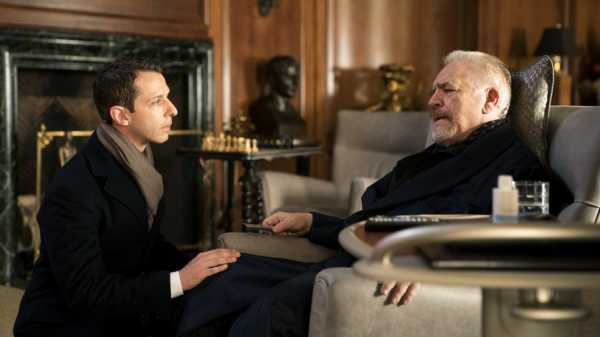
“Succession” (airing Sundays, on HBO) opens with the billionaire media mogul Logan Roy (Brian Cox) rumbling out of bed in the pre-dawn hours of his eightieth birthday. Groping in the dark and moving through a stupor, he pees on the carpet of his Manhattan penthouse. The moment is a portent of decline; later that day, after brusquely reversing a plan to cede his post to his most ambitious son, Logan suffers a brain hemorrhage. Later in the series, once “Succession” has—discreetly but pointedly—invoked a great deal of canine imagery to illustrate the dog-eat-dog dynamics of Logan’s world, you may come to see that first scene as one of a beast marking its territory.
Logan has been married three times, and has four adult children. With its bouncy combination of soap and satire, “Succession” demonstrates an elliptical elegance in clearly diagramming these relationships without spelling them out. Logan’s third and current wife, Marcia (Hiam Abbass), has a crisp formality that, in the minds of her stepchildren, serves to cover treachery. Connor (Alan Ruck), Logan’s son from his first marriage, is a gentleman rancher. He has little interest in the family’s business empire beyond its continued ability to fund the upkeep of his spread in New Mexico, his sugar baby, and his philanthropic pretensions.
Logan’s second marriage produced three children. Kendall (Jeremy Strong), the heir apparent, cracked up his own family with a drug addiction three years before the action begins. His efforts to establish his leadership and to dethrone his father nudge “Succession” in the direction of a dynastic tragedy. Roman (Kieran Culkin) is a jaunty nihilist; squatting and sprawling on tables and countertops, Culkin inhabits space with a squalid sort of entitlement, and he employs a supercilious side-eye as if twirling a mustache. Siobhan (Sarah Snook)—nicknamed Shiv, a rude blade plunged deep—is a political strategist by profession and a dexterous tactician by nature; her boyfriend, Tom (Matthew Macfadyen), is an executive attempting to flatter his way into Logan’s heart.
The trouble is, Logan doesn’t have one. He is the rock of his family, insofar as he is cold and abrasive. He says “fuck off” far more often than “please” or “thank you,” though “Succession” also illustrates the many ways in which those pleasantries can be employed as snubs and insults. The show’s creator is Jesse Armstrong, whose credits include “The Thick of It” and “In the Loop,” productions that share the new series’s verbal energy as characters murmur awkward obsequy, spit quick-draw denigrations, and deliver obscenities with gymnastic panache. When Kendall spars with a digital-media C.E.O., their biz-bro trash talk assumes an absurd quality of erotic role play. When Kendall visits a recuperating Logan to announce—or confess to—a questionable business decision, the old man delivers a standard-issue insult, but the retort gains a special power and sincerity because he needs to pause between each word to access his shallow reservoir of energy—as if berating his child is another of his arduous physical-therapy exercises.
His rude tenacity proves to be his only quality as the season shapes up. The dynamics of the internecine struggle—the squabbles, betrayals, and ad-hoc alliances—are primal in a way that would translate to any ancient clan or provincial enterprise. But the persuasive texture of this portrait of extreme wealth is distinctly contemporary. When Kendall faces up to a creditor, from whom Logan had secretly received a three-billion-dollar loan, the man from the bank says, “If the stock drops, we’re entitled to ask for a payment in full,” and Kendall replies, “Right, I know, but, like, really?” Elsewhere, he tries to talk a helicopter pilot into lifting off into airspace shut down amid a terror alert. The pilot tells him they could be shot out of the sky; Kendall says, “Yeah, but not really, right?” His disbelief, played straight, arouses both distaste and pity, as the princeling learns anew that money cannot always buy freedom from consequences.
Sourse: newyorker.com






